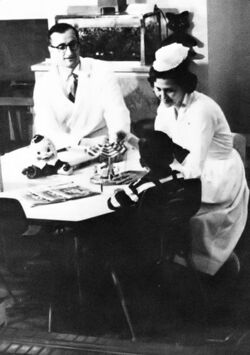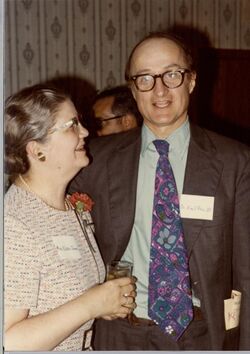Biography:Emil Frei
Emil Frei III | |
|---|---|
 | |
| Born | St. Louis, Missouri |
| Died | April 30, 2013 (aged 89) Oak Park, Illinois |
| Citizenship | United States |
| Alma mater | Colgate University Yale School of Medicine |
| Known for | Cancer research |
| Spouse(s) | Elizabeth Smith (nurse), 1948-1986 (her death) Adoria Brock, 1987-2009 (her death) |
| Children | 5 |
| Scientific career | |
| Institutions | National Cancer Institute MD Anderson Cancer Center Dana–Farber Cancer Institute |
Emil "Tom" Frei III (February 21, 1924 – April 30, 2013) was an American physician and oncologist. He was the former director and former physician-in-chief of the Dana–Farber Cancer Institute in Boston, Massachusetts . He was also the Richard and Susan Smith Distinguished Professor of Medicine at Harvard Medical School.[1]
Early life and education
Frei was born in 1924 in St. Louis.[2] His family owned the stained glass manufacturer Emil Frei & Associates. Frei completed an accelerated pre-med Colgate University in 1944 after only 2 years of study[3] and his medical degree from Yale University in 1948.
Career
He interned at Firmin Desloge Hospital, now St. Louis University Hospital in St. Louis, Missouri and served as a physician in the Korean War. He worked at the National Cancer Institute from 1955 to 1965 and the M. D. Anderson Cancer Center from 1965 to 1972; while at M.D. Anderson he was the founding director of the Department of Development Therapeutics, which evolved into the Clinical Research Center. He served as physician-in-chief at the Dana-Farber Institute from 1972 to 1991. He is best known for his work on the treatment of lymphomas and childhood and adult leukemia.[4] His groundbreaking research into then-controversial combination chemotherapy, including the VAMP regimen, earned him many awards.[3][5]
He coauthored "Cancer Medicine" with Dr. James F. Holland.
Involvement in Cancer Cooperative Group Research
Frei was one of the founders of the Acute Leukemia Group B which later evolved into the Cancer and Leukemia Group B (CALGB). He served as the group chair for 16 years, from 1956 to 1963, and again from 1981 to 1990.[6]
Journal of Clinical Oncology
He coined the Journal of Clinical Oncology in 1981, journal published first issue in 1983 in association with American Society of Clinical Oncology.[7]
Recognition
In 1972 he received the Lasker-DeBakey Clinical Medical Research Award from the Lasker Foundation "for his outstanding contribution in application of the concept of combination chemotherapy for lymphoma and acute adult leukemia."[8] Other awards included the Jeffrey A. Gottlieb Memorial Award (1978); NIH Distinguished Alumni Award (1990); Fellow, American Academy of Arts and Sciences (1999); Pollin Prize for Pediatric Research (2003); and AARC Lifetime Achievement Award (2004).[9]
- 2013 Fellow of the AACR Academy
- 2004 AACR Lifetime Achievement Award
- 1999 Elected Fellow, American Academy of Arts and Sciences
- 1997 Elected Member, Institute of Medicine
- 1990 First NIH Distinguished Alumni Award
- 1989 Armand Hammer Award
- 1985 Hamao Umezawa Award, International Society of Chemotherapy, Infection and Cancer
- 1983 Charles F. Kettering Prize, General Motors Cancer Research Foundation
- 1981 Golden Plate Award of the American Academy of Achievement[10]
- 1980 Elected fellow of the American College of Physicians
- 1972 Lasker-DeBakey Clinical Medical Research Award
- 1971 President, AACR
- 1968 President, American Society of Clinical Oncology
Death
Frei died of Parkinson's disease at his home in Oak Park, Illinois on April 30, 2013. He was 89.[2]
See also
References
- ↑ "Official biography". Dana–Farber Cancer Institute. http://researchers.dana-farber.org/directory/profile.asp?dbase=main&setsize=16&picture_id=0000013&grouptype_typeid_data=2&gs=r&nxtfmt=r&display=Y&oldurl=Y&try2=Y&pict_id=0000013.
- ↑ 2.0 2.1 Fox, Margalit (4 May 2013). "Emil Frei III, Who Put Cancer Cures in Reach, Dies at 89". The New York Times. https://www.nytimes.com/2013/05/05/science/emil-frei-iii-who-put-cancer-cures-in-reach-dies-at-89.html?hpw&_r=0.
- ↑ 3.0 3.1 "Emil Frei III, MD: In Memoriam (1924–2013) | Cancer Research". http://cancerres.aacrjournals.org/content/73/15/4597.
- ↑ "Emil Frei III". Animals in Research. National Institutes of Health. http://science.education.nih.gov/animalresearch.nsf/ResearcherName/Emil+Frei+III#Q1.
- ↑ Mukherjee, Siddhartha (2011). The Emperor of All Maladies. NY: Scribbler. pp. 139–142.
- ↑ "History of CALGB". https://www.calgb.org/Public/about/history.php.
- ↑ Bertino, Joseph R. (1983). "Editorial: A journal for Oncologists". Journal of Clinical Oncology 1 (1): 1. doi:10.1200/JCO.1983.1.1.1. http://jco.ascopubs.org/content/1/1/1.full.pdf+html.
- ↑ "Lasker Award". National Institutes of Health. http://irp.nih.gov/about-us/honors/lasker-award.
- ↑ "Biographical note: Emil Frei, III". Making Cancer History Voices Collection. University of Texas Archival Resources Online. http://www.lib.utexas.edu/taro/utmda/00038/mda-00038.html.
- ↑ "Golden Plate Awardees of the American Academy of Achievement". American Academy of Achievement. https://achievement.org/our-history/golden-plate-awards/#science-exploration.
External links
- Interview with Emil Frei for the Making Cancer History Voices Collection at the University of Texas
 |


